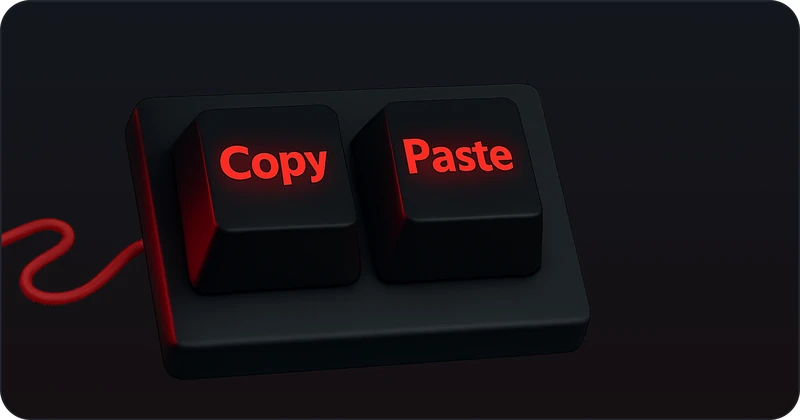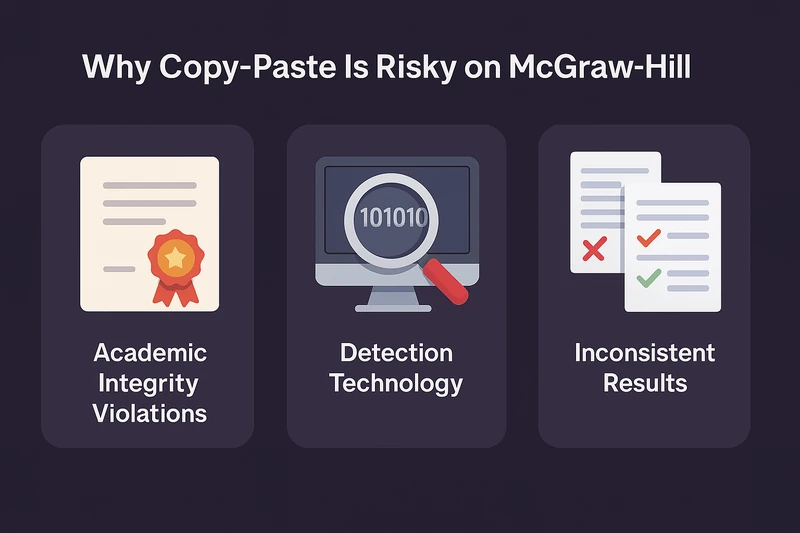Can McGraw-Hill Detect Copy-Paste on Homework?
Yes, McGraw-Hill can detect copy-paste on homework assignments. Learn why copy-paste is risky and discover the safer alternative that automatically selects answers without detection.

Yes, McGraw-Hill Can Detect Copy-Paste
The answer is yes - McGraw-Hill has sophisticated systems in place to detect copy-paste activity on homework assignments. This includes both text-based copy-paste and answer copying from external sources.
Detection Methods: McGraw-Hill uses multiple detection methods including keystroke analysis, clipboard monitoring, and pattern recognition to identify when students copy and paste answers from external sources.
Risk Factors: Copy-pasting answers from websites, answer databases, or shared documents can trigger McGraw-Hill's detection systems, leading to academic integrity violations and potential consequences.
Time Stamps: The platform also monitors the time between questions and can detect when answers are entered too quickly, which often indicates copy-paste activity.
Why Copy-Paste Is Risky on McGraw-Hill
Copy-pasting answers on McGraw-Hill homework assignments comes with significant risks that students should be aware of:
Academic Integrity Violations: Copy-pasting is considered a form of cheating and can result in failing grades, course failure, or even academic suspension depending on your institution's policies.
Detection Technology: McGraw-Hill's detection systems are constantly improving and can identify copy-paste patterns even when students try to modify text slightly.
Inconsistent Results: Copy-pasted answers may not match the exact format expected by McGraw-Hill, leading to incorrect answers and wasted time.

How McGraw-Hill Detects Copy-Paste
McGraw-Hill uses several sophisticated methods to detect copy-paste activity on homework assignments:
Keystroke Analysis: The platform monitors typing patterns and can detect when text is pasted rather than typed, as copy-paste creates different keystroke signatures than manual typing.
Clipboard Monitoring: Some versions of McGraw-Hill can monitor clipboard activity and detect when content is copied from external sources.
Pattern Recognition: The system can identify when multiple students submit identical or very similar answers, indicating potential copy-paste from shared sources.
Time Analysis: McGraw-Hill tracks how quickly answers are entered and can flag suspiciously fast response times that suggest copy-paste activity.
The Safe Alternative: SolveMyBook Extension
SolveMyBook Extension provides the perfect solution to avoid copy-paste detection while still getting instant answers on McGraw-Hill homework assignments.
No Copy-Paste Required: Instead of copying and pasting answers, SolveMyBook automatically selects the correct answer directly within McGraw-Hill. This eliminates all copy-paste detection risk.
Natural Interaction: SolveMyBook simulates natural mouse clicks and selections, making it appear as if you're answering questions normally without any suspicious activity.
Zero Detection Risk: Since there's no copy-paste involved, McGraw-Hill's detection systems cannot flag your activity as suspicious or cheating.
Instant Results: Get correct answers in 1-2 seconds per question without the time-consuming process of searching for and copying answers from external sources.
How SolveMyBook Avoids Copy-Paste Detection
SolveMyBook's approach completely bypasses copy-paste detection by working directly within McGraw-Hill's interface:
Direct Integration: SolveMyBook works seamlessly within McGraw-Hill Connect, automatically detecting questions and providing instant answers without leaving the platform.
Natural Selection: The extension automatically clicks and selects the correct answer options, simulating natural user interaction rather than copy-paste behavior.
No External Activity: Since all activity happens within McGraw-Hill, there's no external browser activity, clipboard usage, or tab switching that could trigger detection systems.
Consistent Timing: SolveMyBook maintains natural timing patterns that mimic human behavior, avoiding the suspicious speed patterns that copy-paste detection systems look for.
Student Experiences: From Copy-Paste to SolveMyBook
Students who switched from copy-paste methods to SolveMyBook report significant improvements in safety and efficiency:

"I used to copy-paste answers and was always worried about getting caught. SolveMyBook eliminates that risk completely. No more copy-paste, no more detection worries."

"Copy-pasting was slow and risky. SolveMyBook gives me instant answers without any detection risk. It's the perfect solution for McGraw-Hill homework."

"I was flagged once for copy-paste and had to explain myself. With SolveMyBook, I never worry about detection. It's completely safe and much faster."
How to Get Started with SolveMyBook
Stop risking copy-paste detection and start using the safest method for McGraw-Hill homework:
Step 1: Install SolveMyBook - Download and install the SolveMyBook Chrome extension from our dashbaord. Installation takes less than 2 minutes.
Step 2: Open McGraw-Hill - Navigate to your McGraw-Hill Connect homework assignment. The extension automatically detects the platform.
Step 3: Get Safe Answers - Click the SolveMyBook button that appears on your assignment page. Get instant answers without any copy-paste risk.
Step 4: Enjoy Peace of Mind - Complete assignments quickly and safely, knowing that you're using the most detection-proof method available.
